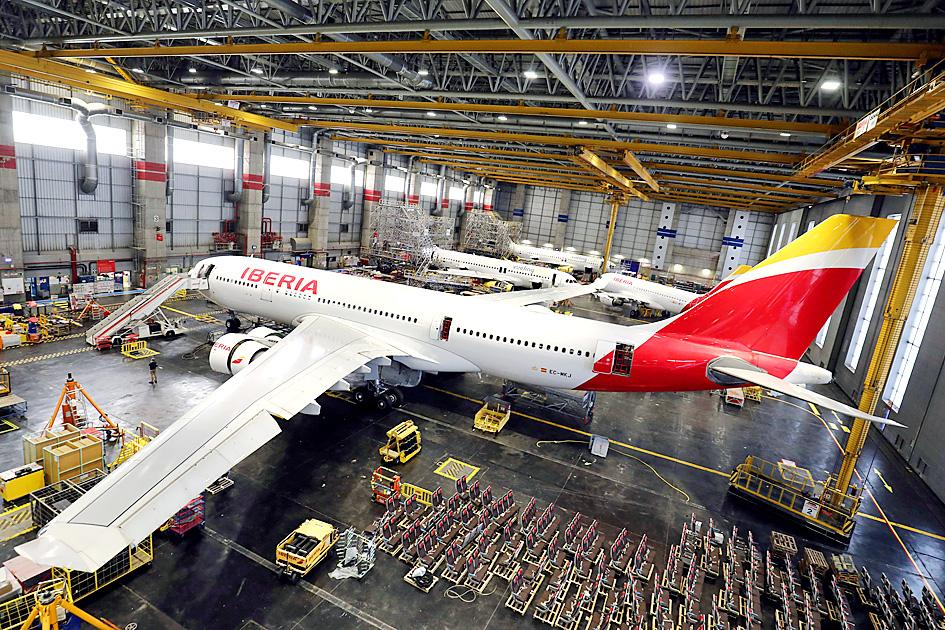Airbus SE posted stronger-than-expected deliveries of 566 jets last year, remaining the world’s largest planemaker as a year of COVID-19 pandemic-induced upheaval for air travel coincided with a grounding crisis at US rival Boeing Co.
Deliveries fell by 34 percent from a record posted a year earlier, when travel demand was riding high on the increasing mobility of consumers in fast-growing markets across Asia.
Now, the aerospace industry is wrestling with the reluctance of most airlines to take delivery of jets as they struggle to save cash and a drop in air traffic that Airbus says could take until 2023 or 2025 to regain the pre-pandemic levels of 2019.

Photo: Reuters
Still, Airbus said it had delivered 566 aircraft last year, exceeding estimates earlier in the year when the COVID-19 crisis led to a lockdown of major travel markets.
“We can be cautiously optimistic for 2021 ... but challenges and uncertainties remain high,” Airbus chief executive Guillaume Faury told reporters.
The planemaker declined to give delivery forecasts for this year ahead of full-year earnings due on Feb. 18.
Airbus sold a net total of 268 aircraft last year after adjusting for cancelations, down from 768 in 2019.
Hampered by the grounding of its best-selling 737 MAX, Boeing delivered 118 jets between January and November last year and had a negative total of 454 net orders before accounting adjustments, giving Airbus an unassailable lead.
Deliveries of the MAX, grounded in March 2019 following two fatal crashes, resumed last month.
Airbus deliveries rose sharply in the second half of last year compared with the first months of the crisis as Airbus made a push for delivery agreements with many airlines, in some cases allowing for temporary storage, according to industry sources.
However, Airbus said virtually all new planes had entered service, even though many were not being flown as intensively as they would have been before COVID-19 upended growth plans.
Faury reaffirmed plans to raise output by 18 percent in the second half of the year, while noting volatility over forecasts, with rising infections offset by accelerating COVID-19 vaccine rollouts.
Cancelations included 10 A350 wide-body jets worth US$3.2 billion at list prices from AirAsia X Bhd.
Airbus said it had taken the decision to cancel the deal, but questions remain over 108 other orders from the troubled Malaysian budget carrier.
Airbus has told a Malaysian court that it stands to lose more than US$5 billion worth of orders as it challenges AirAsia X’s plans to restructure debt.
In total, Airbus lost orders for 26 wide-body jets, reflecting a slump in intercontinental travel that is expected to be the slowest segment to recover.
With the industry’s main showcase, the Paris Airshow, canceled this year, Airbus cautioned that it did not expect a return toward big-ticket jet orders while travel remained depressed.
“It will be a while before we are back on an even keel,” chief commercial officer Christian Scherer said.

PATENTS: MediaTek Inc said it would not comment on ongoing legal cases, but does not expect the legal action by Huawei to affect its business operations Smartphone integrated chips designer MediaTek Inc (聯發科) on Friday said that a lawsuit filed by Chinese smartphone brand Huawei Technologies Co (華為) over alleged patent infringements would have little impact on its operations. In an announcement posted on the Taiwan Stock Exchange, MediaTek said that it would not comment on an ongoing legal case. However, the company said that Huawei’s legal action would have little impact on its operations. MediaTek’s statement came after China-based PRIP Research said on Thursday that Huawei filed a lawsuit with a Chinese district court claiming that MediaTek infringed on its patents. The infringement mentioned in the lawsuit likely involved

Taipei is today suspending work, classes and its US$2.4 trillion stock market as Typhoon Gaemi approaches Taiwan with strong winds and heavy rain. The nation is not conducting securities, currency or fixed income trading, statements from its stock and currency exchanges said. Authorities had yesterday issued a warning that the storm could affect people on land and canceled some ship crossings and domestic flights. Taiwan Semiconductor Manufacturing Co (TSMC, 台積電) expects its local chipmaking fabs to maintain normal production, the company said in an e-mailed statement. The main chipmaker for Apple Inc and Nvidia Corp said it has activated routine typhoon alert

GROWTH: TSMC increased its projected revenue growth for this year to more than 25 percent, citing stronger-than-expected demand for AI devices and smartphones The Taiwan Institute of Economic Research (TIER, 台灣經濟研究院) yesterday raised its forecast for Taiwan’s GDP growth this year from 3.29 percent to 3.85 percent, as exports and private investment recovered faster than it predicted three months ago. The Taipei-based think tank also expects that Taiwan would see a 8.19 percent increase in exports this year, better than the 7.55 percent it projected in April, as US technology giants spent more money on artificial intelligence (AI) infrastructure and development. “There will be more AI servers going forward, but it remains to be seen if the momentum would extend to personal computers, smartphones and

Catastrophic computer outages caused by a software update from one company have once again exposed the dangers of global technological dependence on a handful of players, experts said on Friday. A flawed update sent out by the little-known security firm CrowdStrike Holdings Inc brought airlines, TV stations and myriad other aspects of daily life to a standstill. The outages affected companies or individuals that use CrowdStrike on the Microsoft Inc’s Windows platform. When they applied the update, the incompatible software crashed computers into a frozen state known as the “blue screen of death.” “Today CrowdStrike has become a household name, but not in